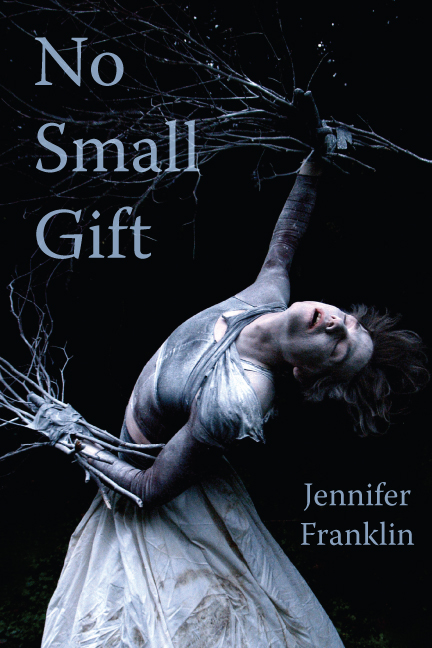
paper • 110 pages • 15.95
ISBN-13: 978-1-945588-20-4
Centered on the theme of regaining a voice, the collection manifests poetry’s power to distill meaning from the chaos of trauma.
Grave illness, profound disability, and stunning cruelty and betrayal are Franklin’s catalysts in No Small Gift: turning the chaos of her trauma into meaning, rediscovering a voice embedded under sutures and scars, making a whole from rent parts. Unflinching biographical details intersect with fictional and historical figures–the mythological personae of Philomela and Lavinia, Vermeer’s tronies and Rodin’s lovers, children killed in the Nazi’s euthanasia program, and other mute victims of abuse and neglect and eyewitness to horror–to animate a collection that proves “every song of grief is still song.”
“First Love” from No Small Gift
The boy beside me
is not you but he
is familiar in all
the important ways.
I pass through life
finding you over
and over again—
oppress you
with love. And
every surrogate?
Afflicted by my
kindness, they leave
me with my music.
I loved you before
I ever loved you.
“…These haunting, beautiful poems show us that it just might be our capacity for love that guides and sustains us through the pain…” – Fred Marchant
“Near the beginning of Jennifer Franklin’s No Small Gift, Nietzsche, on the brink of madness, looks into the eyes of a brutally beaten horse on the street and sees the shock in that gaze turn ‘to recognition, to resignation, to an eye / reflecting a field full of fallen horses.’ Passage through that field of betrayal seems, in these artful, unsparing poems, the only way toward love, which comes after loss, after the damages, on a path lit up by what we make, the art ‘that keeps us from dying of the truth.'” – Mark Doty
“…With her layered images interspersed with near-playful admissions (‘Still life with tongue cancer’—there’s a second way to read that), Franklin turns her journey of devastations into a multidimensional transit of human depth. If joy is to rise out of chaos and pain, there must be a composting process first, an effort of adding air and time. In ‘Amor Fati,’ she marvels, ‘I didn’t / know these cuts would save // more than my body. / I wouldn’t negate any of it / now if I could.’…” Read the full review.
“…Franklin seems to say what others don’t dare, how hard is life’s architecture without love, and yet, pain is most beautiful when it’s true; and Franklin phrases her thoughts with a keen eye and delicate touch….” Read the full review.
“…While she seems most at home in the classical, there’s nothing of art, drama, or literature that seems too far out of reach….” Read the full review.
“…Franklin’s undiminished sense of gratitude makes the book’s title feel appropriate. Most affecting for me is Franklin’s ability to recognize and embrace, in brief moments, real happiness. With ‘a clean MRI report’ in ‘After Radiation,’ she ‘float[s]’ down a New York sidewalk with a fresh bunch of flowers, trying to memorize details: ‘this shade of sky, / the busker’s hoarse voice // as he strums his broken guitar / on the subway stairs.’ Franklin knows that ‘The intensity of this joy / won’t last. But it should.'”
“This book tells us much about what’s not acceptable, what will not be tolerated, what will not be taken. That illness, disability, struggle, betrayal, and abandonment never spell the ending of song, a motif that dots the landscape of this collection in myriad ways: in joy, in sorrow, in brokenness. So much of this book sings the song of solitude—of the husband who leaves, of the daughter who suffers seizures, of the asylum always looming….While women in this collection are often caged, the author provides counterweights to our oppressive restrictions. Love imprisons, as does the body. Such is the nature of affection, being, and endings. But in this realization, Franklin shows us that pain can be pardoning….We discover the endless universe beyond our physical boundaries when physical limitations are imposed. Dreams abound within and without these constraints.” Read the full review.